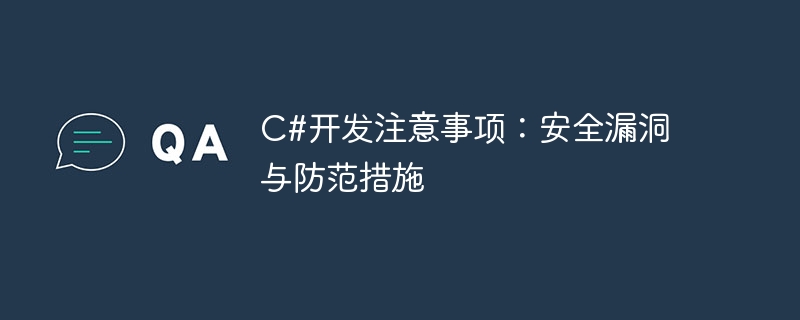Home >Backend Development >C#.Net Tutorial >C# Development Notes: Security Vulnerabilities and Preventive Measures
C# Development Notes: Security Vulnerabilities and Preventive Measures
- WBOYWBOYWBOYWBOYWBOYWBOYWBOYWBOYWBOYWBOYWBOYWBOYWBOriginal
- 2023-11-22 19:18:231499browse

#C# is a programming language widely used on Windows platforms. Its popularity is inseparable from its powerful functions and flexibility. However, precisely because of its wide application, C# programs also face various security risks and vulnerabilities. This article will introduce some common security vulnerabilities in C# development and discuss some preventive measures.
- Input Validation
User input is one of the most common security holes in C# programs. Unvalidated user input may contain malicious code, such as SQL injection, XSS attacks, etc. To protect against such attacks, all user input must be rigorously validated and filtered. After receiving user input, built-in validation mechanisms, such as regular expressions, or custom validation methods should be used to ensure the validity of the input. In addition, care should be taken to avoid showing unfiltered input results to users to prevent potential security risks. - Cross-site scripting (XSS) attack
XSS attack is a common attack method that obtains user private information by injecting malicious script code. To prevent XSS attacks, C# developers should use native defense mechanisms such as HTML encoding and filtering. By properly escaping and filtering user input, you can ensure that malicious scripts are not executed. In addition, you should also pay attention to setting HTTP headers appropriately to prevent the browser from executing malicious scripts. - Cross-site request forgery (CSRF) attack
CSRF attacks are implemented by impersonating the user's identity and sending malicious requests. In order to prevent CSRF attacks, the following measures can be taken: Use CSRF tokens to verify the legitimacy of requests. For sensitive operations, such as modifying user information or making payments, users should be required to confirm the operation, and use verification codes and other means to increase user verification. In addition, secure coding practices should be followed, such as avoiding using GET requests for sensitive operations, avoiding using automatic login, etc. - Password Security
Password security is an important aspect in C# development. In order to ensure the security of passwords, the following measures should be taken: use a strong password policy that requires password length, complexity, etc.; use hash algorithms to encrypt and store user passwords, such as SHA-256, etc.; prohibit plain text storage of passwords and avoid using unsafe passwords. Encryption algorithms, such as MD5; prevent password grabbing and brute force attacks, and adopt reasonable login restriction measures, such as locking accounts, limiting the number of attempts, etc. - File Upload Security
The file upload function is one of the common functions in C# applications, but it is also a source of security risks. To prevent file upload vulnerabilities, developers should strictly inspect and filter uploaded files. Verify the file type, size, suffix, etc. to ensure that only legal and safe files are allowed to be uploaded. Additionally, uploaded files should be stored in a secure location and avoid saving files directly in the web application root directory. - Encryption and Decryption
In C# development, encryption and decryption are important means to protect sensitive data. Use appropriate encryption algorithms and key management mechanisms to encrypt sensitive data for storage and transmission. To prevent key leaks, you can store the keys in a protected configuration file or use a hardware encryption module. In addition, when using third-party encryption libraries, you should be careful to choose trustworthy libraries and avoid using versions with known security vulnerabilities.
Summary:
Security vulnerabilities in C# development are issues that developers must pay attention to. Application security can be effectively improved through strict input validation, defense against XSS and CSRF attacks, and handling of security issues such as passwords and file uploads. In addition, regular security vulnerability scanning and code review, and timely repair of discovered vulnerabilities are also important means to ensure the security of C# applications. Only by taking security factors into consideration can more trustworthy C# applications be developed.
The above is the detailed content of C# Development Notes: Security Vulnerabilities and Preventive Measures. For more information, please follow other related articles on the PHP Chinese website!
Related articles
See more- C# development of WeChat portals and applications - messaging for WeChat enterprise accounts (text, pictures, files, voice, video, graphic messages, etc.)
- c# develops WeChat to implement jssdk signature generation
- Use c# to develop public platform custom menu function example code
- How to Troubleshoot Security Vulnerabilities and Attacks on Linux Servers

